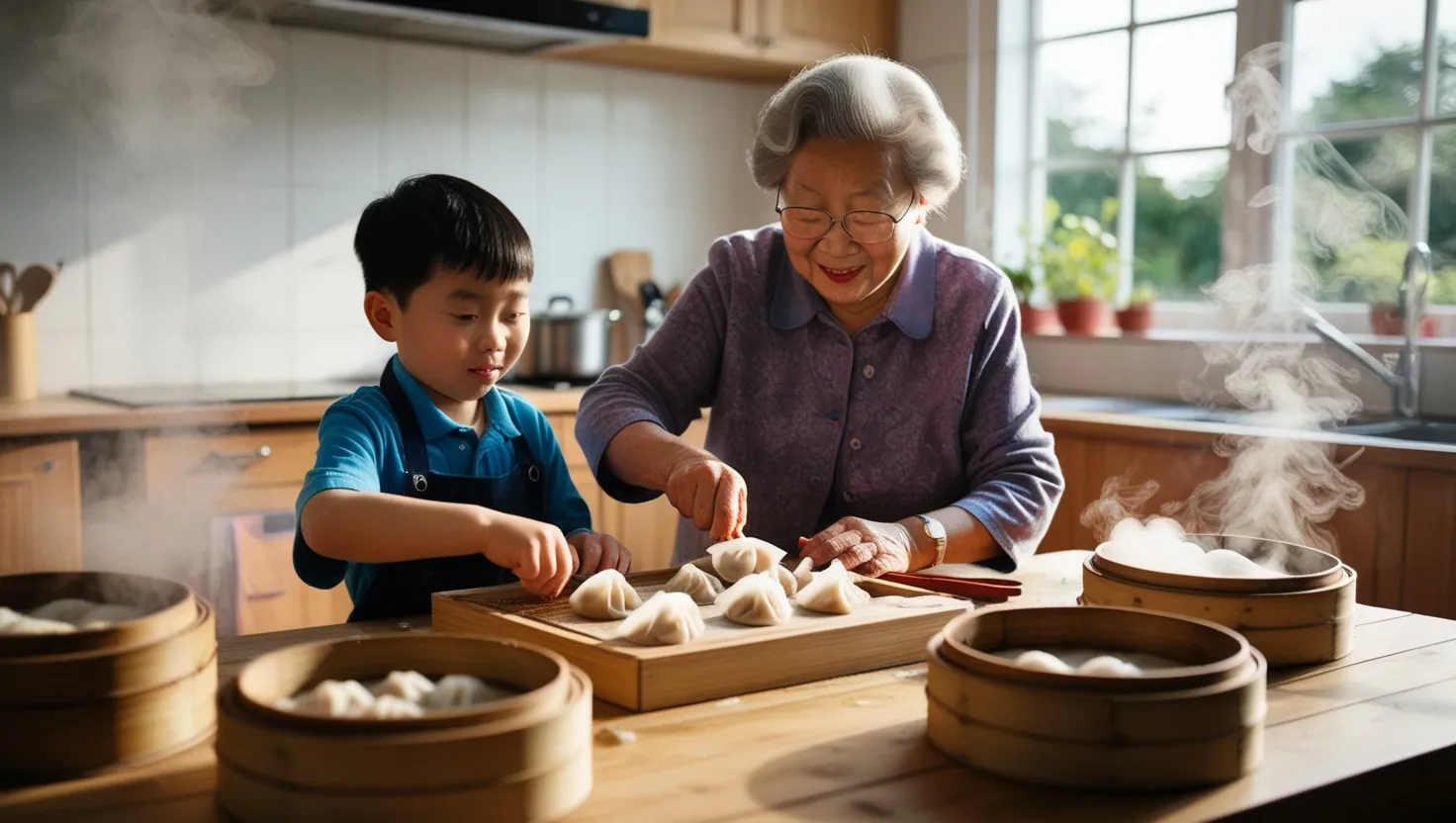The aroma of ginger and garlic filled the small kitchen as Wei’s wrinkled hands deftly folded a perfect crescent of dough around a spoonful of savory filling. Her grandson, Michael, watched intently, trying to mimic her practiced movements.
“Ah, not so tight,” Wei chided gently in Mandarin. “The dumpling must have room to breathe when it cooks.”
Michael nodded, his brow furrowed in concentration as he adjusted his technique. At 12 years old, he was eager to learn the family recipes, but found himself constantly amazed by the precision and artistry his grandmother brought to even the simplest dishes.
“Nai nai,” he asked, using the affectionate term for grandmother, “how did you learn to make dumplings so perfectly?”
Wei’s eyes crinkled as she smiled, memories of her own childhood in a small village outside Beijing flooding back. “My mother taught me, just as her mother taught her. These dumplings carry the story of our family through generations.”
As they worked side by side, Wei shared tales of her life in China - the hardships she’d faced, the joy of family gatherings centered around food, and the bittersweet journey that brought her to America decades ago. Michael listened, absorbing not just the techniques of dumpling-making, but the rich cultural heritage woven into each bite.
“Food is memory,” Wei explained. “When we make these dumplings, we keep our history alive.”
The upcoming community food festival had sparked this impromptu cooking lesson. Michael had excitedly told his grandmother about the event, suggesting they set up a booth to share their family’s famous dumplings. Wei had hesitated at first, protective of recipes passed down through generations. But seeing her grandson’s enthusiasm, she realized this was an opportunity to pass on more than just culinary skills.
“If we’re going to sell at the festival,” Wei mused, “we need to think about more than just the taste. We must consider the cost of ingredients, how many we can make, and what price to charge.”
Michael’s eyes lit up. He’d been learning about business basics in school and saw a chance to apply that knowledge. “We can make a spreadsheet, Nai nai! Figure out all the numbers.”
Wei chuckled at his eagerness. “Very good. But remember, some things can’t be measured in numbers alone. The value of tradition, of sharing our culture - that’s priceless.”
As they finished the batch of dumplings, Michael pulled out his laptop. Together, they began listing ingredients and quantities, researching bulk prices at the local Asian market. Wei marveled at how quickly her grandson navigated the computer, while Michael was impressed by his grandmother’s ability to estimate measurements by eye and feel.
“How much should we charge?” Michael asked, staring at the columns of figures.
Wei considered carefully. “We must cover our costs, of course. But we don’t want to price so high that people can’t enjoy them. The joy of sharing our food is worth more than extra profit.”
Michael nodded, understanding the balance between business and cultural exchange. They settled on a fair price that would allow them to break even while keeping the dumplings accessible.
As they planned, Wei shared stories of the dumpling’s significance in Chinese culture. “During Lunar New Year, families gather to make dumplings together. The shape resembles ancient gold ingots - a symbol of wealth and prosperity.”
Michael typed notes furiously, determined to create informational cards for their booth. “Maybe we can offer a discount if people try folding their own dumpling?” he suggested.
Wei beamed with pride at her grandson’s creativity. “An excellent idea! Teaching others brings us closer together.”
Over the next few weeks, their kitchen became a flurry of activity. Wei taught Michael the intricacies of balancing flavors, while he introduced her to online ordering for supplies. They experimented with different fillings, debating the merits of traditional pork versus vegetarian options to appeal to a wider audience.
“Remember,” Wei cautioned as they tweaked the recipe, “we honor our ancestors by preserving the essence of the dish, even as we adapt.”
The night before the festival, they stayed up late, a production line of dumpling-making efficiency. Wei’s practiced hands formed perfect crescents while Michael managed the steamer and packaging. They laughed, sharing stories and creating new memories with each dumpling folded.
As dawn broke, they surveyed their work - hundreds of dumplings nestled in bamboo steamers, ready to be shared. Michael yawned, exhausted but exhilarated.
“Nai nai,” he said softly, “thank you for teaching me. Not just about dumplings, but about our family, our culture.”
Wei pulled him into a tight hug, her eyes misty. “And thank you, my little dumpling, for helping this old woman embrace new ways while honoring the old.”
At the festival, their booth buzzed with activity. The aroma of steaming dumplings drew curious visitors, while Michael’s enthusiasm in explaining the cultural significance kept them engaged. Wei demonstrated the art of dumpling folding, her weathered hands guiding novices through the process.
As the day progressed, they noticed something unexpected. Beyond the steady sales, people lingered at their booth, sharing their own family food traditions. A Vietnamese grandmother swapped rice cake recipes with Wei, while an Italian-American teenager excitedly compared dumpling techniques to ravioli-making.
Michael furiously scribbled notes, realizing their booth had become a hub of cultural exchange. The dumplings weren’t just a product - they were a catalyst for connection.
By the end of the festival, their steamers were empty and their cash box full. But the real treasure was the sense of community they’d fostered. As they packed up, Michael turned to his grandmother with shining eyes.
“Nai nai, we did more than sell dumplings today. We shared a piece of our heritage with the whole town.”
Wei nodded, her heart full. “And in doing so, we’ve ensured that our family’s legacy will continue. You, my dear boy, are now part of that unbroken chain.”
As they walked home, arms laden with empty steamers and newfound friendships, Wei realized that this experience had taught her as much as it had her grandson. She had feared that adapting their family recipe for a wider audience might dilute its significance. Instead, sharing it had only strengthened its power to connect people across cultures.
Michael chattered excitedly about ideas for next year’s festival - new flavors to try, interactive dumpling-making stations, maybe even a small recipe book. Wei listened, marveling at how her grandson seamlessly blended respect for tradition with innovation.
“You know,” she said thoughtfully, “there’s an old Chinese saying: ‘The young bird teaches the old bird to fly.’ Today, you’ve shown me new ways our family’s legacy can soar.”
Michael beamed at the compliment. “And you’ve shown me that the most valuable lessons can’t be calculated on a spreadsheet, Nai nai.”
As they entered their home, the lingering scent of dumplings welcomed them. Wei knew that tonight’s dinner would be simple - leftover dumplings reheated and shared over more stories. But now, those dumplings carried not just the weight of generations past, but the promise of generations to come.
In teaching her grandson the art of dumpling-making, Wei had passed on far more than a recipe. She had given him roots to ground him and wings to explore. And in return, Michael had shown her that preserving culture didn’t mean keeping it locked away, but sharing it proudly with the world.
As they settled in to enjoy their hard-earned meal, Wei raised her teacup in a toast. “To family, to tradition, and to the beautiful way they grow and change - just like a perfectly steamed dumpling.”
Michael clinked his cup against hers, grinning. “And to many more festivals, Nai nai. We make a pretty good team.”
Wei nodded, her heart full. In the simple act of making dumplings, they had found a way to bridge generations, cultures, and communities. And that, she realized, was the true recipe for preserving heritage in a changing world.






